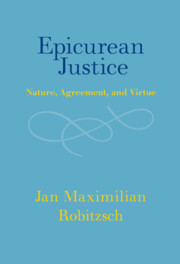Book contents
- Epicurean Justice
- Epicurean Justice
- Copyright page
- Dedication
- Contents
- Acknowledgments
- Introduction
- Chapter 1 The Origin of Justice
- Chapter 2 Contractual Justice
- Chapter 3 Aretaic Justice
- Chapter 4 Moral Psychology
- Chapter 5 Justice and Law
- Chapter 6 Ethical Naturalism
- Chapter 7 Conclusion
- Book part
- Bibliography
- Index Locorum
- General Index
Chapter 1 - The Origin of Justice
Published online by Cambridge University Press: 07 March 2024
- Epicurean Justice
- Epicurean Justice
- Copyright page
- Dedication
- Contents
- Acknowledgments
- Introduction
- Chapter 1 The Origin of Justice
- Chapter 2 Contractual Justice
- Chapter 3 Aretaic Justice
- Chapter 4 Moral Psychology
- Chapter 5 Justice and Law
- Chapter 6 Ethical Naturalism
- Chapter 7 Conclusion
- Book part
- Bibliography
- Index Locorum
- General Index
Summary
This chapter relates how justice comes to be on the Epicurean view by examining in detail the Epicurean account preserved in Lucretius’ On the Nature of Things V. In doing so, the chapter shows that the Epicureans are defenders of a kind of social contract theory and so side with defenders of nomos in the nomos-phusis debate. Nevertheless, their conception of nomos is importantly constrained by phusis. Furthermore, the chapter also argues against those readers who have characterized the Epicurean account of the social contract as Hobbesian. If the Epicurean account is to be assimilated to a modern view, the ideas of Jean-Jacques Rousseau are a much better fit.
- Type
- Chapter
- Information
- Epicurean JusticeNature, Agreement, and Virtue, pp. 14 - 48Publisher: Cambridge University PressPrint publication year: 2024

